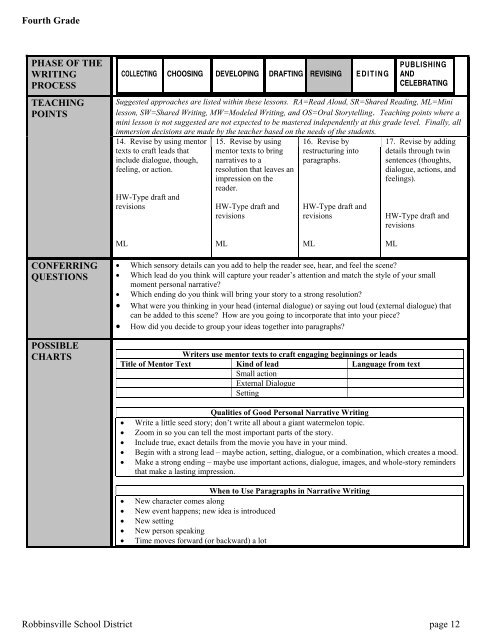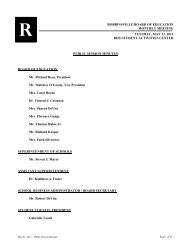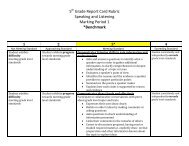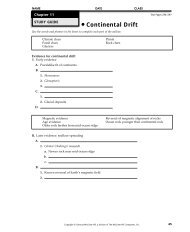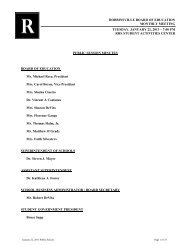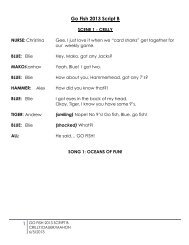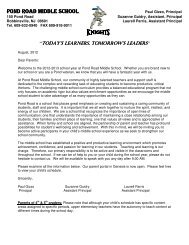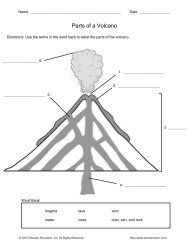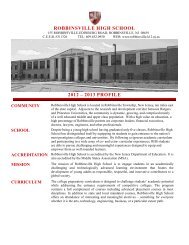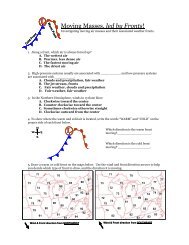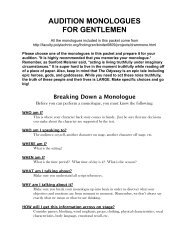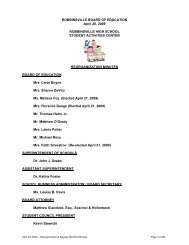Writing - Robbinsville Public School District
Writing - Robbinsville Public School District
Writing - Robbinsville Public School District
Create successful ePaper yourself
Turn your PDF publications into a flip-book with our unique Google optimized e-Paper software.
Fourth Grade<br />
PHASE OF THE<br />
WRITING<br />
PROCESS<br />
TEACHING<br />
POINTS<br />
COLLECTING CHOOSING DEVELOPING DRAFTING REVISING EDITING<br />
PUBLISHING<br />
AND<br />
CELEBRATING<br />
Suggested approaches are listed within these lessons. RA=Read Aloud, SR=Shared Reading, ML=Mini<br />
lesson, SW=Shared <strong>Writing</strong>, MW=Modeled <strong>Writing</strong>, and OS=Oral Storytelling. Teaching points where a<br />
mini lesson is not suggested are not expected to be mastered independently at this grade level. Finally, all<br />
immersion decisions are made by the teacher based on the needs of the students.<br />
14. Revise by using mentor<br />
texts to craft leads that<br />
include dialogue, though,<br />
feeling, or action.<br />
HW-Type draft and<br />
revisions<br />
15. Revise by using<br />
mentor texts to bring<br />
narratives to a<br />
resolution that leaves an<br />
impression on the<br />
reader.<br />
HW-Type draft and<br />
revisions<br />
16. Revise by<br />
restructuring into<br />
paragraphs.<br />
HW-Type draft and<br />
revisions<br />
17. Revise by adding<br />
details through twin<br />
sentences (thoughts,<br />
dialogue, actions, and<br />
feelings).<br />
HW-Type draft and<br />
revisions<br />
ML<br />
ML<br />
ML<br />
ML<br />
CONFERRING<br />
QUESTIONS<br />
<br />
<br />
<br />
<br />
<br />
Which sensory details can you add to help the reader see, hear, and feel the scene<br />
Which lead do you think will capture your reader’s attention and match the style of your small<br />
moment personal narrative<br />
Which ending do you think will bring your story to a strong resolution<br />
What were you thinking in your head (internal dialogue) or saying out loud (external dialogue) that<br />
can be added to this scene How are you going to incorporate that into your piece<br />
How did you decide to group your ideas together into paragraphs<br />
POSSIBLE<br />
CHARTS<br />
Writers use mentor texts to craft engaging beginnings or leads<br />
Title of Mentor Text Kind of lead Language from text<br />
Small action<br />
External Dialogue<br />
Setting<br />
<br />
<br />
<br />
<br />
<br />
<br />
<br />
<br />
<br />
<br />
Qualities of Good Personal Narrative <strong>Writing</strong><br />
Write a little seed story; don’t write all about a giant watermelon topic.<br />
Zoom in so you can tell the most important parts of the story.<br />
Include true, exact details from the movie you have in your mind.<br />
Begin with a strong lead – maybe action, setting, dialogue, or a combination, which creates a mood.<br />
Make a strong ending – maybe use important actions, dialogue, images, and whole-story reminders<br />
that make a lasting impression.<br />
When to Use Paragraphs in Narrative <strong>Writing</strong><br />
New character comes along<br />
New event happens; new idea is introduced<br />
New setting<br />
New person speaking<br />
Time moves forward (or backward) a lot<br />
<strong>Robbinsville</strong> <strong>School</strong> <strong>District</strong> page 12


